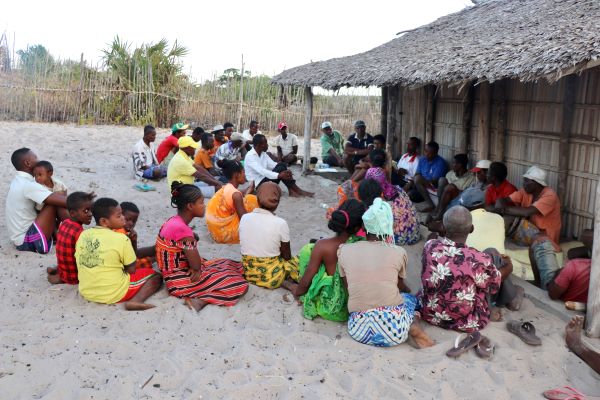First published on 09/24/2019, and last updated on 09/26/2019
By Jazzy Rasolojaona, Programme Officer at Natural Justice, Member of ICCA Consortium,
and Vololoniaina Rasoarimanana, Council Member of ICCA Consortium and Strategic Advisor of TAFO MIHAAVO, Member of ICCA Consortium.
*Fokonolona are local communities.
Strengthening synergy for a common cause. This was the motivation behind the collaboration between the TAFO MIHAAVO network (a national network of local communities managing natural resources) and MIHARI (Madagascar Locally Managed Marine Area Network). Both institutions aspire to secure indigenous and community areas and heritage through the full recognition of local communities’ rights to community land and community-managed marine areas.
The current government’s initiative for developing a legislative framework on special status areas, including community land rights, offers an opportunity to achieve this goal. A national consultation workshop on the topic was held during the week of August 5 – 9 of this year, in Toliary (in the southwest region of the island). By the end of the workshop, the Ministry in charge of land and the two institutions had agreed upon a roadmap defining the steps to be taken to ensure that the text being developed would take into account the realities on the ground. TAFO MIHAAVO has played a major role in the development of this roadmap and will play a key role in its implementation. MIHARI is now joining the process in order to integrate the specific issue of coastal and marine areas and communities.
The two institutions held preliminary meetings from July to early September with the contribution of NGOs such as Natural Justice, Ravintsara, SIF and other organizations and resource persons supporting this goal. The objective was to agree on ways to be more active and proactive in the government’s initiative, to work with them along the timeline they have outlined, and above all to agree on the key concepts and arguments underlying community land.

Indeed, several questions remain to be explored and agreed upon, including the definition of which “local communities” will be granted these rights. The answer to this question is still controversial. The same applies to the communities’ status to qualify for legal recognition. It is part of the criteria for defining and delimiting community lands and ICCAs-territories of life in Madagascar and the relations between them, the rights to be granted to communities for the governance of these areas beyond the limit of the simple execution of a management plan, and more.
It is generally accepted that the legal recognition of ICCAs is necessary for their security, because, in the current state of the legal system, positive law remains the guiding principle of state authorities. Thus, in the face of more powerful interests or individuals with rights granted by the State, self-recognition by the grassroots actors alone may not be sufficient to grant them the authority to deal with these other parties.
This situation is one of the main causes of conflicts between local communities and other actors in the management and governance of resources located on their land. There is often a strong dichotomy between modern law and the customary rules and practices of communities, and this conflicting set of values and interests is often not perceptible or understandable to actors outside the communities. The experiences of the local communities who make up the membership of TAFO MIHAAVO and MIHARI, including those of the 14 emblematic ICCAs, will be critical to informing the discussions. Beyond the projects initiatives, the actors involved in the process in Madagascar agreed on the importance of maintaining a dynamic working group to keep an active watch over the diversity, quality, and vitality of the community-based governance.

The key message that the two institutions want to convey is not to dismantle and overhaul the existing community management systems, some of which have been recognized by the legal framework and implemented over many years. Rather, the goal is to realize in full the terms of existing agreements. For example, one of the main systems (GELOSE) only recognizes local associative structures called Local Based Communities as having rights over natural resources whose management has been transferred to them by the State. Membership in this structure is voluntary for local communities, but it has been noted by the local community network itself that many local communities have not been able to take ownership of this right. Similarly, in many cases, the power to manage resources alone does not allow local communities to participate in the decision-making process. This is the case, for example, when there is a change in the status of an area managed by communities into a protected area, when there have been many cases of local communities’ rights not being discussed in advance.
A clear message coming out of the collaboration in Madagascar is the need to recognize all forms of community-based natural resource management, including the structures, rules, and customary practices that have enabled these local communities to sustainably manage the resources on their lands for generations. This recognition must consider at least two inseparable aspects. On the one hand, there is the recognition of ICCAs as physical territories, and therefore the well-defined areas to which legally recognized status will be granted (Community Protected Areas, collective properties or other). On the other hand, there is the governance aspect where, among other things, local communities are demanding that their customary governance system be maintained and recognized.
The process in Madagascar will be followed and supported as it unfolds.
Pictures © Jazzy Rasolojaona.
